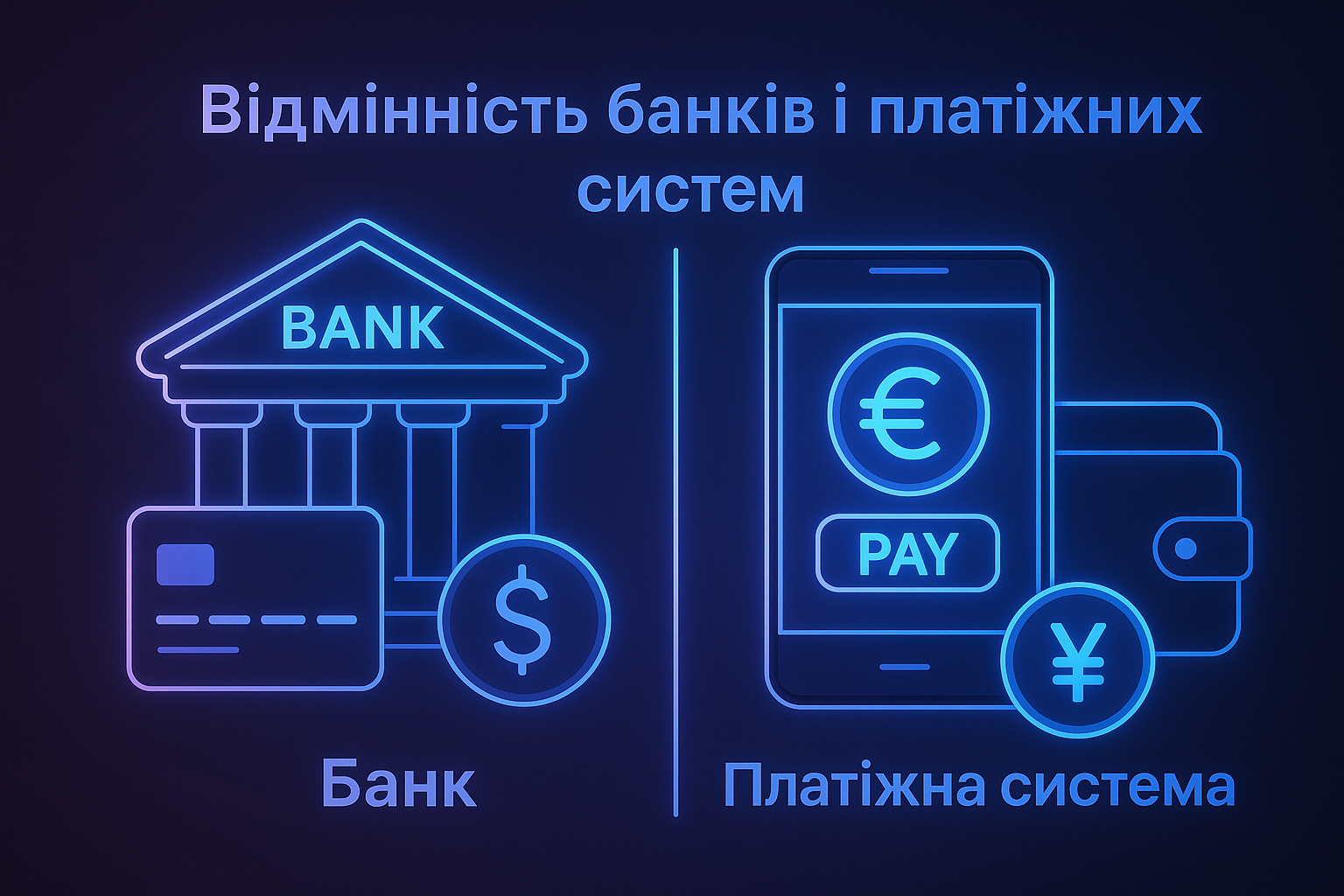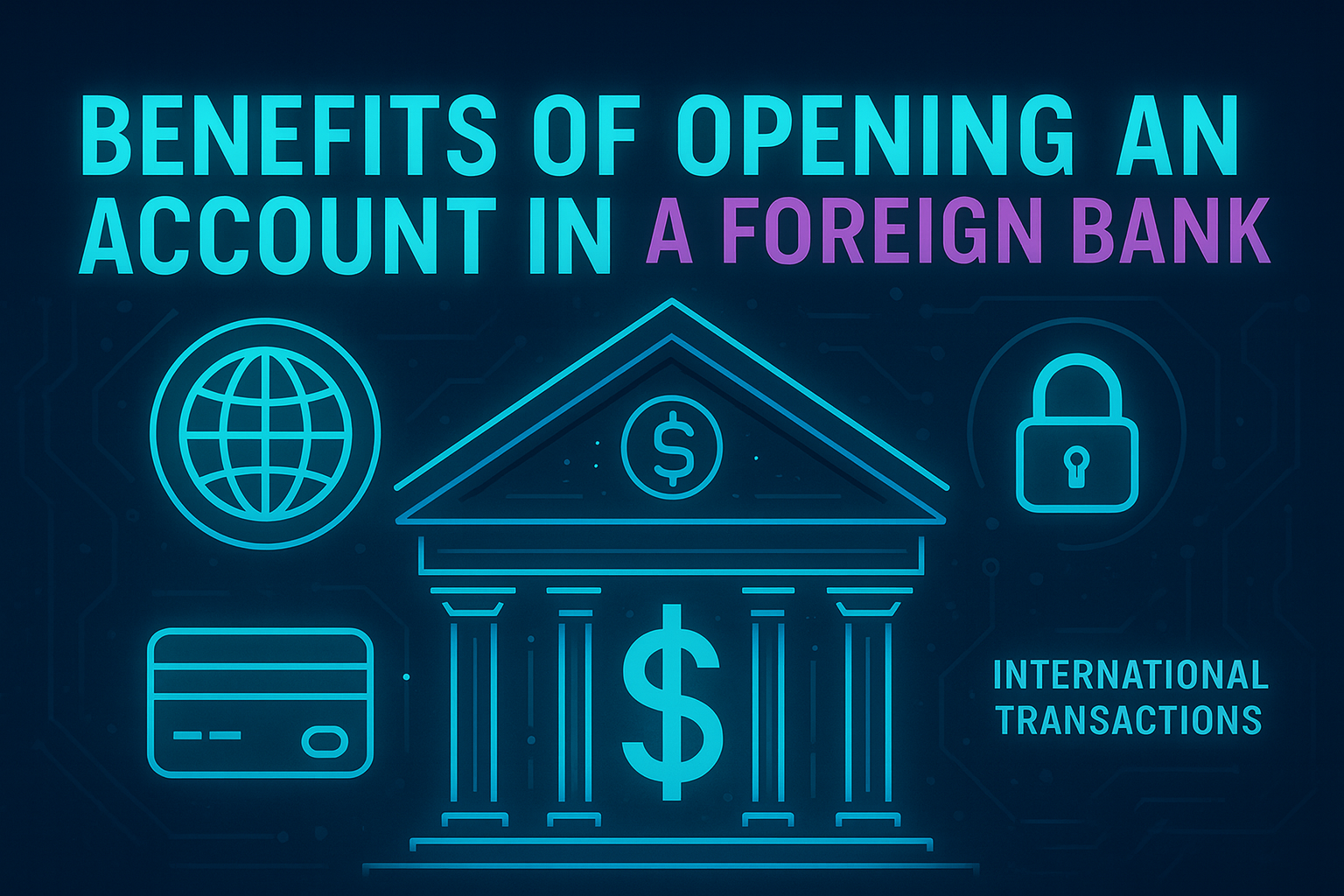It is impossible to imagine the modern world without digital technologies, fast online transfers, and bank cards. This is a world without borders, where a mobile app allows you to receive payment in euros from a customer in Austria and instantly buy goods in China for yuan.
You can manage your assets online, invest or work on international exchanges without wasting time traveling abroad. That's why a foreign bank account is a must-have for businesses of all sizes and a common practice for keeping personal assets safe.
But in addition to traditional banks, entrepreneurs are increasingly using payment systems. These non-bank financial institutions provide many opportunities for cooperation with Ebay, Amazon, Shopify, and international exchanges, fast online account opening, mobile applications, and many other digital options.
How do you know what is right for you - an account in a foreign bank or a payment system? What is the difference between a bank and a payment system?
In this article, we will analyze the difference between banks and payment systems, compare the disadvantages and advantages. We will share our conclusions and recommendations on which clients should open an account in a foreign bank and which ones should choose opening an account in a payment system.
What is a payment system and why are payment systems for business popular in 2025?

As we know, a bank is a financial institution that accepts and stores customer funds and provides financial services such as account opening, lending, currency transactions, or international transfers. The main function of a bank is to ensure the safe circulation of money and promote the financial stability of businesses and individuals.
A payment system (or EMI - Electronic Money Institution) is a financial institution licensed to issue electronic money and make transfers without a banking license. Legally, such institutions are not banks and, accordingly, have restrictions when working with clients. For example, payment systems are not allowed to keep deposits or provide loans, are obliged to keep client funds on separate accounts in partner banks, etc.
Top payment systems for business in 2025
In 2025, the market of payment systems for business is led by innovative players that offer instant account opening for foreign companies. The top payment systems include:
These platforms are distinguished by the ease of registering a business account - a few minutes of online verification is enough, unlike banks, where the process of opening an account can take weeks.
Banks and payment systems: key differences and advantages

There are significant legal, regulatory, and financial differences between banks and payment systems that should be taken into account when choosing a tool for international payments.
Juridical status of a bank and a payment system
The main difference between a bank and a payment system is the legal nature of these institutions.
A bank is a financial institution that receives a banking license and has the right not only to store but also to use customer funds, for example, to issue loans or place deposits.
A payment system (EMI or PI) has a limited license that allows it to accept, store and transfer funds without using them for its own purposes.
Criteria | Bank | Payment system |
License | Banking license (issued by the central bank of the country) | EMI (Electronic Money Institution) or PI (Payment Institution) license, issued by the financial regulator |
Regulator | Central bank or national financial authority | Financial supervisory authority (e.g, FCA in the UK, Bafin in Germany, NBB in Belgium) |
Activities | Deposits, Loans, guarantees, investment products | Essue of electronic money, payments, currency conversion |
Guarantees for clients | State deposit guarantee system (up to 100 000 EUR in the EU) | No state guarantees, but clients' funds are kept in segregated accounts |
Physical presence | Usually a personal visit is required to open an account | Opening an account is completely remote |
Opening an account: Online vs in-person
One of the key advantages of payment systems is the ability to open an account remotely. Foreign banks require a personal visit of the owner or director of the company for identification, signing of documents, and an interview. A visit to the bank does not always guarantee the opening of an account.
Payment systems, on the contrary, work on the model of remote KYC - as a rule, the client uploads documents, undergoes video identification, signs an agreement with the payment system electronically, and within a few days after the Compliance check, receives account details.
Deposits, loans and other financial instruments
The bank can perform all classic financial functions - from accepting deposits to lending to businesses. That's why the state guarantees the safety of deposits up to EUR 100,000 within the European insurance system (Deposit Guarantee Scheme).
Payment systems are not allowed to attract customer funds as deposits or charge interest. They are obliged to keep customer funds separate from their own - in segregated accounts with partner banks. This ensures operational security, but does not provide clients with the same level of state protection as in a bank.
Service, client support, and personal managers
Another important difference is the level of client service. In banks, each corporate client usually has a personal manager or private banker who accompanies payments, helps with compliance, currency limits, and documents to confirm the source of funds.
In payment systems, a personal manager is not always provided. Often, the client interacts with the technical support team via chat or email. The exception is licensed EMIs with premium service, where there are managers for corporate clients.
Security, regulation, and guarantees of funds
Banks are subject to the strict requirements of international standards Basel III, FATCA, CRS, and AMLD6, which provide for enhanced risk control, compliance with financial monitoring requirements, and transparent reporting to regulators.
Payment systems are regulated by the directive PSD2 (Payment Services Directive 2) and must:
ensure segregation of customer funds,
implement Strong Customer Authentication (SCA),
regularly undergo audits and approvals from the regulator.
However, they are not covered by state deposit guarantees, as banks are. Therefore, we recommend that you always keep your funds in foreign banks.
Benefits of opening an account in a foreign bank

Access to interbank transactions and settlements. A bank account is a direct access to SEPA and SWIFT systems.
The ability to use all financial instruments (lending, letters of credit, escrow accounts, trading, accounts in gold and other metals, etc.
The company can simultaneously keep funds in several currencies (EUR, USD, GBP, CHF, etc.) and make payments without unnecessary conversion costs.
Asset protection through the deposit guarantee system. Banks in jurisdictions with developed legal systems (e.g., the EU, the USA, Switzerland, Singapore) ensure the protection of customer funds in accordance with the requirements of international and local legislation.
Developed compliance system. Banks provide a high level of customer protection against fraud, constant monitoring of transactions and protection of personal data.
Keeping funds in EUR, USD, CHF will allow you to reduce the risks in case of devaluation of the local currency.
In addition to an account in a local bank, you can open a foreign account for a company or a personal account in a foreign bank. This will allow you to minimize the risks from economic instability in the country where you live.
Having an account in a foreign bank strengthens the company's business reputation, especially in the B2B sector, as payments from a European account are often perceived by partners as a sign of business stability and transparency.
Personal manager and banking support. Corporate clients often have a personal manager or a private banker who accompanies the client on all issues related to the use of the account.
Foreign banks serve complex corporate structures, such as holdings, funds, and trusts.
Difficulties of opening an account in a foreign bank

Detailed verification of the company's beneficiary (Know Your Customer procedure). Any foreign bank is primarily interested in who the business owner is. Therefore, the bank wants to understand not only the ownership structure of the company and its business activity, but also the source of the beneficiary's income, professional experience and country of tax residence.
Strict requirements for jurisdictions. Most modern foreign banks do not open accounts for companies registered in offshore jurisdictions (e.g., Seychelles, Belize, Panama, Nevis, Cayman Islands, etc.)
Long account opening process. The process of opening a corporate account in a foreign bank can take 1 to 2 months. At the bank's request, you may need translations, notarization and Apostille on documents, additional updated extracts or certificates, the company's corporate structure, confirmation of the sources of funds, a detailed description of activities and information about counterparties.
Personal visit to a bank branch. Unlike payment systems, all foreign banks require a personal meeting to identify the client. This may be a requirement to visit a bank branch, a personal meeting with a private banker in a neutral country, or an online meeting to meet the bank manager.
Elevated risk profile of Ukrainian citizens. Unfortunately, due to the martial law, many banks now classify Ukraine as a high-risk country. This leads to the need to undergo additional compliance checks when opening an account or increased requirements for the source of the client's funds.
Disputed "residency" status for Ukrainian citizens. Some foreign banks require confirmation of residence in European countries, but if a Ukrainian citizen provides an address in another country, the question of tax residency and the availability of a European tax number arises. This means that it is now almost impossible to confirm the address of residence in an EU country for a bank simply by providing a lease agreement, you also need to show a tax number in the country of residence.
Economic feasibility of the company's activities and substance. Foreign banks usually require documentary evidence that the company's activities have a connection with the country where the account is to be opened. Such requirements include not only the existence of an office lease agreement, but also the presence of local counterparties, actual business activities within the country, local employees, a local tax number, etc.
High fees. Each bank determines its own tariffs (for example, account opening fees, monthly or quarterly account maintenance fees, fees for incoming and outgoing payments, issuing Internet banking or cards). There may also be additional fees for reviewing documents from customers from certain countries or forms of companies. For some banks, you will have additional costs for document translation or Apostille. Opening an account with a foreign bank does not guarantee unhindered use of the account. Be prepared for the fact that each transaction is analyzed and you will receive regular requests from the bank regarding the purpose of the payment, the economic feasibility of the transaction or your counterparties.
Blocking of the account without the right of appeal. Many bank agreements (especially with Swiss banks) do not provide for an appeal mechanism on the part of the client. That is why the bank may close the account without explanation, referring to the internal policy.
Examples from practice:
When opening accounts with banks in Switzerland and banks Liechtenstein for Ukrainian citizens whose income originates from the territory of Ukraine, a minimum deposit of EUR 3-5 million is required, while for EU residents it is only EUR 500,000.
To open an account in Polish banks, the company's documents must be translated by a Polish sworn translator.
If a foreign company tries to open an account in Lithuanian banks, but does not have local counterparties or an office, the bank will refuse to open an account.
Benefits of opening an account in payment systems

Given the difficulties that clients face when opening and using an account in a foreign bank, many entrepreneurs choose payment systems as an alternative to classic banks. The advantages of opening an account in a payment system include:
Ease and speed of account opening. Opening an account in a payment system involves an online procedure, without a personal visit abroad. An account in a payment system can be opened in a few business days.
Fees in payment systems are lower than in banks and often depend on the client's turnover.
Payment systems are focused on the cross-border business and provide the ability to make payments via SEPA, SWIFT, ACH, as well as APIs for the automation of operations, integration with payment gateways, and CRM.
Payment systems offer convenient integration with such freelance platforms as Upwork and Shopify, as well as with the largest marketplaces Amazon and Ebay.
Lack of substance requirements. Most payment systems do not require confirmation of the connection between the company's activities and the country where the account is opened.
The ability to open an account for individuals or sole proprietors, which is convenient for freelancers or e-commerce.
Ideal for remote businesses - freelancers, IT companies, and anyone who works regardless of their location and permanent geographical location in a particular country.
Management through a mobile application - all operations from invoice payment to currency exchange can be performed through the application from anywhere in the world.
Flexibility in working with cryptocurrencies. Some payment systems support work with digital assets or provide the ability to convert from crypto to fiat.
Disadvantages of opening an account in payment systems

Limited functionality. Payment systems have limited functionality and do not work with some financial instruments - there are no overdrafts, deposits, loans, letters of credit, etc. Also, some payment systems have limited capabilities to use the SWIFT system or certain currencies.
Lack of insurance coverage for customer funds. Although customer funds are kept in a separate account with the central bank, they are not insured by the state. Therefore, in case of bankruptcy of the payment system or blocking of its accounts, customer funds are not subject to state-guaranteed insurance.
Lack of physical branches. All account opening and customer service procedures take place online. Unlike a bank, you cannot come to a branch and withdraw funds through the cash desk.
Payment systems use automatic compliance systems, a support team option, or a chat to communicate with customers. The personal support service (personal manager) is either not provided by the system or is provided only for certain categories of customers with certain turnovers.
Risk of automatic account blocking. Payment systems use automated control mechanisms. Sometimes, AI is also involved in AML and KYC processes. If certain triggers are triggered, such automatic systems often block transactions or accounts without explanation. Such triggers can include a new counterparty, an unusual amount, IP from a suspicious country, etc.
The risky status of Ukrainian citizens. Due to the martial law, many payment systems classify Ukraine as a high AML risk country and impose additional restrictions or block access to certain functions (for example, ordering and delivering a card in the Wise payment system).
Limitations on depositing own funds. Some payment systems do not have the function of self-funding. This means that the company cannot make the first incoming payment from its account opened in another payment system or bank.
Lack of a mechanism for protecting rights. Usually, the terms of use (Terms & Conditions) are unilateral and governed by the law of the jurisdiction in which the payment system is registered. Most often, these are the UK, Latvia, Lithuania, and Cyprus. And since the client of the payment system is a user of the service, in order to appeal the blocking or closure of the account, it is necessary to file a complaint with the central regulator (for example, the FCA in the UK) and involve local lawyers.
Unilateral termination of the contract. Read the terms of use of payment services carefully. Payment systems have the right to close an account at any time without explanation if it is provided for in the agreement.
How to choose between a bank and a payment system

The choice between a bank and a payment system depends on many factors, your goals for opening an account, activities and transaction volumes, counterparties, and sources of income. And of course, it depends on the set of options that are important to you."
Do you need to open an account online quickly? Then choose to open an account in a payment system. Payment systems are suitable for IT companies, e-commerce, start-ups, small and medium-sized businesses with multi-currency operations, work with marketplaces, sole traders and freelancers who have customers abroad.
Are fund preservation, personal support, lending and investment programmes important to you? Then opening an account with a foreign bank is the best option for you.
Our recommendation in today's environment is to combine accounts in a bank and a payment system. An account in a foreign bank can be used to save funds and assets, invest, and settle accounts with large counterparties.
An account in a payment system is the most convenient and fastest tool for daily payments and online transactions. This combination ensures that you minimize risks and optimize your business process.

